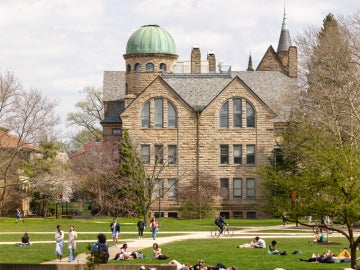Raptor Watch
September 28, 2015
Kasey Cheydleur

Steph Szarmach ’15 holding a Northern Harrier.
Photo credit: Steph Szarmach
Steph Szarmach ’15, a biology and environmental studies major, says she has known for a while that she wanted to pursue a career in conservation biology. After a summer research experience with Boise State University’s Raptor Research program, she narrowed her focus to birds of prey. When a fellow student in her ornithology class mentioned the Golden Gate Raptor Observatory program (GGRO), she knew she had to follow up. “I knew an internship with the GGRO would be a perfect fit because it would allow me to gain more experience in field biology, apply raptor research skills I learned last summer, and explore public environmental education and citizen science” says Szarmach.
The Stratham, New Hampshire, native now spends five days a week identifying and counting raptors flying through the San Francisco Bay Area. She also catches individual raptors to collect data on size, age, sex, and health of the birds; she then releases them with a non-invasive leg band so they can later be identified and researchers can learn more about where the birds are traveling and the threats they face in the wild. The research is part of a long-term data set being used to answer questions about raptor movements, environmental threats, and the effects of climate change.
Szarmach says working with the community is an important part of GGRO’s work. “Since our Hawkwatch site is so close to a major metropolitan area, the Golden Gate Raptor Observatory is much more accessible to the public than other organizations’ sites. Working with so many talented and enthusiastic citizen scientists is definitely one of the most rewarding parts of this job. This program shows that a person doesn’t need to have a degree in biology or a career in a science-related field in order to contribute meaningfully to important research.”
In the future, Szarmach says she wants to continue her field experiences and eventually pursue master’s or PhD in conservation biology with a focus on raptor biology and population genetics.
You may also like…
Oberlin Launches Critical AI Studies Minor in Fall 2026
With a solid foundation in both science and the humanities, this minor ensures students to understand and be able to analyze the ethical, cultural, environmental, political, economic, technological, and labor effects of AI.
Chudi Martin Jr. ’24 Earns Prestigious Gates Cambridge Scholarship
Chudi Martin Jr. ’24 earns prestigious Gates Cambridge Scholarship.
Going Places
Earlier this year, Luca Johnson ’24 landed his dream role: working on the Safe Routes Philly initiative. Managed by Philadelphia’s Office of Transportation, Infrastructure, and Sustainability, the...


